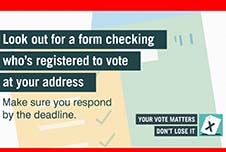
Don't lose your voice
Residents in the St Albans District are urged to ensure they are registered to vote at future elections by completing a household enquiry form.
Around 60,000 forms are being sent to households by St Albans City and District Council.
This action is a major part of the Council’s annual voter registration canvass to keep the electoral register up to date.
People’s names need to be on the register in order for them to vote at elections such as next year’s District Council and Parish Council ballots.
The form lists everyone currently registered to vote at a particular address. Residents should check that the information is correct and that no names are missing or wrongly included.
If no changes are needed, they should confirm this online at www.householdresponse.com/stalbans.
Alternatively, they can do so by free phone or text with full details of these procedures included in the form.
If the form needs to be amended, this can also be done on the website or by post, using a freepost envelope which is enclosed with the form.
Michael Lovelady, Electoral Registration Officer for St Albans City and District Council, said:
It’s important that residents respond as soon as possible, so we can make sure we have the right details on the electoral register for every address in the District.
To make sure you are able to have your say at next year’s elections, simply check the form when it arrives and respond as soon as you can.
If you’re not currently registered, your name will not appear on the form. If you want to register, the easiest way is online at www.gov.uk/register-to-vote or we’ll send you information explaining how to do this in the post. In any case, you will still need to complete the form and send it back to us.
People who have moved address recently are particularly encouraged to keep an eye out for the form and check the details.
Research by the independent Electoral Commission indicates that recent home movers are far less likely to be registered than those that have lived at the same address for a long time.
Across Great Britain, 94% of people who have been at their property for more than sixteen years will be registered, compared to 40% of people who have lived at an address for less than one year.
Melanie Davidson, Head of Support and Improvement at the Electoral Commission, said:
It’s really important that everyone who is entitled to vote is able to do so; checking the form that will arrive through the post is one of the easiest ways to find out if you are already registered. There’s lots of helpful information about registering to vote on our website www.yourvotematters.co.uk.
Residents who have questions can contact the elections’ team by email at elections@stalbans.gov.uk or by telephoning 01727 819294.
Contact for the media:
John McJannet, Principal Communications Officer, St Albans City & District Council
Tel: 01727 296130, E-mail: john.mcjannet@stalbans.gov.uk
Notes:
1. St Albans City and District Council elections are taking place in May 2019 with around one third of the seats to be contested
2. The electoral register lists the names and addresses of everyone who is registered to vote in public elections. The register is used for electoral purposes, such as making sure only eligible people can vote. It is also used for other limited purposes specified in law, such as: detecting crime (e.g. fraud), calling people for jury service or checking credit applications.
3. The open register is an extract of the electoral register, but is not used for elections. It can be bought by any person, company or organisation. For example, it is used by businesses and charities to confirm name and address details. Your name and address will be included in the open register unless you ask for them to be removed. Removing your details from the open register does not affect your right to vote.
4. To be eligible to register to vote a person must be:
- Aged 16 or over (a person may register to vote at 16, but may not vote until they are 18)
- A British or qualifying Commonwealth citizen who has leave to enter and remain in the UK or does not require such leave.
- A citizen of the Republic of Ireland or other European Union (EU) member state.
5. British citizens, Irish citizens and qualifying citizens of Commonwealth countries (including Cyprus and Malta), as well as citizens of other EU member states can vote in local government elections and Police and Crime Commissioner elections in England and Wales.
6. Full details of the Electoral Commission’s research on the electoral registers is available here: bit.ly/2tMjtd5.
